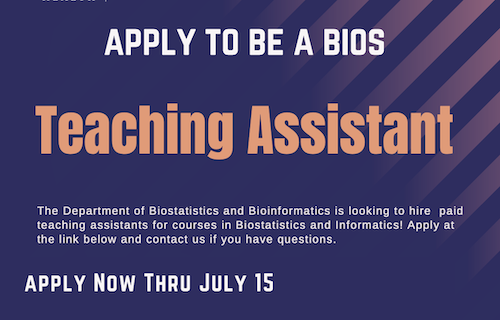TA Positions Available, Multiple BIOS and INFO Courses
Category : Student Opportunities
The Department of Biostatistics and Bioinformatics is looking to hire paid teaching assistants for courses in Biostatistics and Informatics! Apply here by July 15!
Teaching assistants (TAs) are graduate student employees who under the direct supervision of faculty/instructors, prepare and deliver course materials related to delivering instruction for a course. These activities include grading papers, potentially leading discussion sessions, conducting laboratory exercises, hosting office hours, and keeping class records. It is also an expectation will obtain teaching and leadership skills, gain an increased understanding of the discipline and of course earn money while helping your peers! You are encouraged to connect with the instructor of the course of interest.
Responsibilities
- 10 hours a week
- Must be reliable and an effective communicator
- Meet with your faculty/class instructor routinely to prepare for activities
- If assigned as a TA for BIOS 500 or 501, you are expected to attend the actual lab
- Responsible for making any copies per the request of the faculty as well as disseminating any information to students
- Communicate your office hours, including days and times to the faculty member and ADAP
Qualifications
- Must be a full time 2nd year MPH/MSPH or PhD student in good academic standing
- Prior completion of the course for which you are assigned with a grade of B+ or higher required or evidence of equivalent academic experience
Courses
- Statistical Methods I Lab GROUP B (BIOS 500L)
- TU 5:00-6:50pm – In person
- Instructor: George Cotsonis
- Statistical Methods I Lab GROUP C (BIOS 500L)
- W 3:00-4:50pm – In person
- Instructor: TBA
- Statistical Methods I Lab GROUP C (BIOS 500L)
- W 5:00-6:50pm – Online Synchronous
- Instructor: TBA
- Statistical Methods I Lab GROUP D (BIOS 500L)
- TH 5:00-6:50pm – In person
- Instructor: TBA
- Statistical Methods I Lab GROUP E (BIOS 500L)
- Online asynchronous
- Instructor: Alex Edwards
- Introduction to Geographical Information Systems (INFO 530)
- M 10:00-11:50am – In person (8/24/22 – 10/18/22)
- Instructor: Lance Waller
- Introduction to Geographical Information Systems (INFO 530)
- Does not meet
- Instructor: Lance Waller
- Introduction to Geographical Information Systems (INFO 530)
- W 10:00-11:50am – In person (8/24/22 – 10/18/22)
- Instructor: Lance Waller
- Advanced Geographical Information Systems (INFO 532)
- MW 10:00am-11:50am – In person (10/19/22 – 12/6/22)
- Instructor: Lance Waller
- Advanced Geographical Information Systems (INFO 532)
- Does not meet (10/19/22 – 12/6/22)
- Instructor: Lance Waller
